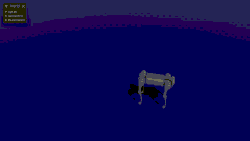33 releases
| 0.16.0 | Apr 27, 2025 |
|---|---|
| 0.15.0 | Dec 6, 2024 |
| 0.14.0 | Jul 5, 2024 |
| 0.13.0 | Feb 20, 2024 |
| 0.0.5 | May 11, 2022 |
#184 in Game dev
262 downloads per month
Used in bevy_rl_shooter
1MB
595 lines
🏋️♀️ bevy_rl

Reinforcement Learning for Bevy Engine
Build Reinforcement Learning Gym environments with Bevy engine to train AI agents that can learn from screen pixels or defined obeservation state.
📝Features
- Set of APIs to implement OpenAI Gym interface, such as
reset,step,renderand associated simulator states - Multi-Agent support
- Rendering screen pixels to RAM buffer — for training agents with raw pixels
- REST API to control agents
👩💻 Usage
1. Define Action and Obeservation Space
Observation space needs to be Serializable for REST API to work.
// Action space
#[derive(Default)]
pub struct Actions {
// actuator_signals: [f32; 3],
}
// Observation space
#[derive(Default, Serialize, Clone)]
pub struct Observations {
// agent_coords: [(f32, f32); 16],
}
2. Enable AI Gym Plugin
Width and height should exceed 256, otherwise wgpu will panic.
// Setup bevy_rl
let ai_gym_state = AIGymState::<Actions, State>::new(AIGymSettings {
width: u32, // Width and height of the screen
height: u32, // ...
num_agents: 1, // Number of agents — each will get a camera handle
render_to_buffer: false, // You can disable rendering to buffer
pause_interval: 0.01, // 100 Hz
..default()
});
app.insert_resource(ai_gym_state)
.add_plugins(AIGymPlugin::<Actions, Observations>::default());
2.1 (Optional) Enable Rendering to Buffer
If your environment wants to export raw pixels, you will need to attach a render target to each camera you want to export them from. Render targets are copied each frame from GPU memory to RAM buffers so that they can be accessed with REST API.
pub(crate) fn spawn_cameras(
ai_gym_state: Res<AIGymState<Actions, Observations>>,
) {
let mut ai_gym_state = ai_gym_state.lock().unwrap();
let ai_gym_settings = ai_gym_state.settings.clone();
for i in 0..ai_gym_settings.num_agents {
let render_image_handle = ai_gym_state.render_image_handles[i as usize].clone();
let render_target = RenderTarget::Image(render_image_handle);
let camera_bundle = Camera3dBundle {
camera: Camera {
target: render_target, // Render target is baked in bevy_rl and used to export pixels
priority: -1, // set to -1 to render at the firstmost pass
..default()
},
..default()
};
commands.spawn(camera_bundle);
}
}
4. Handle bevy_rl events
bevy_rl will communicate with your environment through events. Those events initiate from REST API or bevy_rl.SimulationPauseTimer that pauses the simulation with given interval (AIGymSettings.pause_interval).
| Event | Description | Usage |
|---|---|---|
EventReset |
Reset environment to initial state | You should rebuild your evnironment here |
EventControl |
Switch to control state | You should recieve actions here and apply them to your environment (and resume simulation) |
EventPause |
Pause environment execution | Pause physics engine or game clock and take snapshot of your game state |
Here's example of how to handle those events:
// EventPauseResume
fn bevy_rl_pause_request(
mut pause_event_reader: EventReader<EventPauseResume>,
ai_gym_state: Res<AIGymState<Actions, State>>,
) {
for _ in pause_event_reader.iter() {
// Pause simulation (physics engine)
// ...
// Collect state into serializable struct
let env_state = Observations(...);
// Set bevy_rl gym state
let mut ai_gym_state = ai_gym_state.lock().unwrap();
ai_gym_state.set_env_state(env_state);
}
}
// EventControl
fn bevy_rl_control_request(
mut pause_event_reader: EventReader<EventControl>,
mut simulation_state: ResMut<State<SimulationState>>,
) {
for control in pause_event_reader.iter() {
let unparsed_actions = &control.0;
for i in 0..unparsed_actions.len() {
if let Some(unparsed_action) = unparsed_actions[i].clone() {
let action: Vec<f64> = serde_json::from_str(&unparsed_action).unwrap();
// Pass control inputs to your agents
// ...
}
}
// Resume simulation (physics engine)
// ...
// Return to running state; note that it uses pop/push to avoid
// entering `SystemSet::on_enter(SimulationState::Running)` which initialized game world anew
simulation_state.pop().unwrap();
}
}
/// Handle bevy_rl::EventReset
pub(crate) fn bevy_rl_reset_request(
mut reset_event_reader: EventReader<EventReset>,
mut commands: Commands,
mut walls: Query<Entity, &Wall>,
mut players: Query<(Entity, &Actor)>,
mut simulation_state: ResMut<State<SimulationState>>,
ai_gym_state: Res<AIGymState<Actions, Observations>>,
) {
if reset_event_reader.iter().count() == 0 {
return;
}
// Reset envrionment state here
// Return simulation in Running state
simulation_state.set(SimulationState::Running).unwrap();
// tell bevy_rl that environment is reset and return response to REST API
let ai_gym_state = ai_gym_state.lock().unwrap();
ai_gym_state.send_reset_result(true);
}
Register systems to handle bevy_rl events.
app.add_systems(
Update,
(
.with_system(bevy_rl_control_request)
.with_system(bevy_rl_reset_request)
.with_system(bevy_rl_pause_request),
).in_set(SimulationState::PausedForControl)
);
💻 AIGymState API
Those methods are available on AIGymState resource. You should use them to alter bevy_rl internal state.
| Method | Description | Usage |
|---|---|---|
set_reward(agent_index: usize, score: f32) |
Set reward for an agent | When a certain event happens, you can set reward for an agent. |
set_terminated(agent_index: usize, result: bool) |
Set termination status for an agent | Once your agent is killed, you should set it's status to true. Useful for Multi-agent. |
reset() |
Reset bevy_rl state | You should call this method when you reset your environment to clear exported state history |
set_env_state(state: State) |
Set current environment state | When you serialize your environment state, you should set it here. |
send_reset_result(result: bool) |
Send reset result to REST API | You should call this method when you have reset your environment to sychronize with REST API |
🌐 REST API
Accessing bevy_rl-enabled environment is possible through REST API. Here's a list of available endpoints:
| Method | Verb | bevy_rl version |
|---|---|---|
| Camera Pixels | GET | http://localhost:7878/visual_observations |
| State | GET | http://localhost:7878/state |
| Reset Environment | GET | http://localhost:7878/reset |
| Step | GET | http://localhost:7878/step?payload=ACTION |
bevy_rl_shooter implements an example Python wrapper.
✍️ Examples
- bevy_rl_shooter — example FPS project
- bevy_quadruped_neural_control — quadruped locomotion with bevy_mujoco and bevy_rl
Dependencies
~33–67MB
~1M SLoC